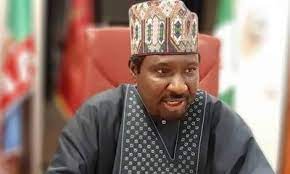The Nigeria Governors’ Forum (NGF) Wednesday said the Executive Order 10 issued 2020 by President Muhammadu Buhari to guarantee financial autonomy of state legislature and judiciary was needless.
The governors said there was no basis for the Order aimed at supporting implementation of financial autonomy for the judiciary and legislature, insisting the president was ill-advised.
NGF Vice Chairman and Sokoto state Governor Aminu Waziri Tambuwal stated this in Ado-Ekiti at a colloquium organised by the Ekiti state Ministry of Justice Academy, in honour of the retiring Chief Judge of the state, Justice Ayodeji Daramola.
Speaking on “The Judicial Autonomy: Perspective of the Nigerian Governors’ Forum,” Tambuwal said the Forum expected President Buhari to have consulted widely before issuing the order, describing the unilateral exercise of such powers as ‘sheer illegality.’
While pointing out that the governors were not opposed to financial autonomy for the concerned arms of government, Tambuwa said the delay in implementation was occasioned by the process, structure and quest for legal clarity.
“Nigeria in Section 121(3) provides that: “Any amount standing to the credit of the – (a) House of Assembly of the State; and (b) Judiciary In the Consolidated revenue Fund of the State shall be paid directly to the said bodies respectively; in the case of the judiciary, such amount shall be paid directly to the heads of the courts concerned.
“As Governors of the 36 States under the platform of the Nigeria Governors’ Forum (NGF), let me state very clearly that we are unequivocally committed to the autonomy of the judiciary and the legislature.
“In the journey to our current position as Chief Executives of our various States, we have all benefitted from the independence and professionalism of the judiciary, be it at the level of administering our Oath of Office or our electoral victory being upheld at the Tribunal or in Court in the interest of democracy, justice, and fairness.
“The concept of judicial autonomy has its foundations in the time tested doctrine of Separation of Powers. The main object is to avoid autocratic government by eliminating the over concentration of powers in one person, agency or institution.
“It’s critical democratic elements is the principle of checks and balances between and among the three arms of government.”
“The recent misunderstanding on the financial autonomy of the Judiciary is predicated on the need to establish an implementation framework to the 4th Alteration of the 1999 Constitution of the Federal Republic of Nigeria in Section 121(3). What we have questioned, and we have made this known at every opportunity, is the process of implementing this provision of the Constitution.
“As governors, we will be failing in our responsibility if we refuse to draw the attention of the President, stakeholders and the country to grave concerns about the constitutionality of Executive Order 10 of 2020. That was the basis of the position that we took on the Executive Order 10.
“The Executive Order 10 ostensibly intended to support the implementation of judicial financial autonomy, was completely unnecessary and ill advised. Let me at this juncture state clearly that we never questioned the right of Mr. President to issue Executive Orders. We only stated that Section 121(3) did not require Presidential Executive Fiat to become implementable.
Tambuwal expressed delight that consensus has finally been reached on the autonomy conundrum and opined that the strike is expected to be suspended anytime soon.
“The agreement allows a period of 45 days for implementation structures to be put in place across States including the enactment of a Fund Management Law which will grant the Judiciary the power to manage its capital and recurrent expenditures in accordance with the provisions of constitution.
“Budgetary releases to the judiciary will be pro-rated based on the actual revenues recorded each month by the state government. Monthly revenue reconciliation and allocation will be presided over by a State Account Allocation Committee (SAAC) to be set up under the Fund Management Law – a similar practice to what we have at the federal level.
“We hope that this will put an end to the long weeks of strike action that have seen our judicial and criminal justice system grounded to a halt. We have lost so much in the past weeks. The big takeaway is the centrality of communication, sincerity, trust and dialogue.
“We have requested that the President disbands the Presidential Implementation Committee on the Autonomy of State Legislature and Judiciary, to avert future rancor between the various arms of government, arising from misconceived guidance from a committee lacking the requisite understanding of constitutional matters,” the NGF said.
Corroborating Tambuwal’s position, the NGF Chairman and Ekiti state Governor Kayode Fayemi said the presidential directive was unconstitutional and illegal as it undermined the executive power of the governors stipulated in the 1999 Constitution.
Fayemi said the states’ governors were committed to financial autonomy for the legislature and judiciary, stressing that “democracy can’t endure if we subject the independence of these two arms to the jackboots of the governors.
“Who is to take capital spending for the judiciary and legislature has always been the controversy. The governors will continue to hold our judiciary with reverence because I know that this democracy will not endure, if we subject our judiciary to the jackboots of the executive.
“There is no questioning the fact that we can do a lot more for our judiciary to make it truly independent.”
The Sokoto state governor expressed happiness that a consensus was finally reached on the matter of judicial autonomy.
“The agreement allows a period of 45 days for implementation structures to be put in place across States including the enactment of a Fund Management Law which will grant the Judiciary the power to manage its capital and recurrent expenditures in accordance with the provisions of constitution. Budgetary releases,” he said.
Speaking at the event, Justice Daramola said judicial autonomy was essential ingredients for democratic consolidation.
He further added that judicial autonomy was adequately guaranteed in the 1999 Constitution, saying Section 121 (3) was simple and should be respected by state governors.




